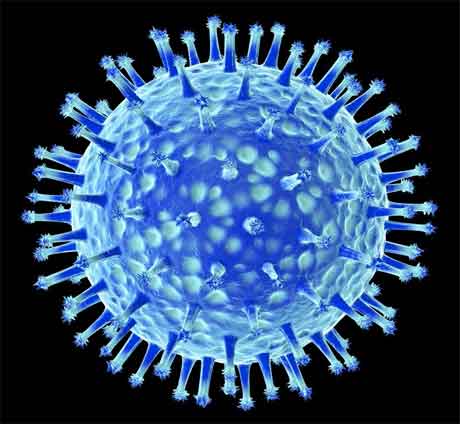Electron micrograph of the bird flu virus. Google is funding an initiative to spot dangerous pathogens that leap from animals to humans.
Google has pledged to try to stop the next global pandemic by investing $15m in a series of hi-tech health schemes.
Money from the internet giant will provide funding for six projects that aim to detect new diseases and understand the conditions that help them spread – potentially saving millions of lives in the process.
"Business as usual won't prevent the next Aids or Sars," said Dr Larry Brilliant, the executive director of Google.org. "The teams we're funding today are on the frontiers of digital and genetic early-detection technology."
In the first round of grants, $15m (£8.8m) is being spread among organisations working to identify and prevent infectious diseases that have the potential to become global pandemics.
Among the biggest beneficiaries is the Global Viral Forecasting Initiative, a group that collects blood samples from humans and animals around the world in order to spot dangerous pathogens that leap from animals to humans.
Examples of pandemic diseases that have followed this route include HIV, Sars and bird flu – even if the link has taken years or even decades to be determined.
The initiative will receive $5.5m from Google.org in order to expand its remit. Its founder, Dr Nathan Wolfe, said that the development could have a huge impact.
"Every hour, on every continent, viruses move from animals into people," he said. "Working in animal markets, with restaurant workers and with hunters at the end of the road, we sort through this traffic to stop deadly diseases before they spread."
Google will also be contributing $2.5m to a scheme run by the Mailman School of Public Health, based at Columbia University in New York, which aims to speed up its programme to discover new pathogens.
The other organisations receiving grants as part of the announcement include the International Research Institute for Climate and Society – also at Columbia – and the University Corporation for Atmospheric Research, which will both receive $900,000 to improve weather prediction and forecasting.
Although it may not appear that the weather has a strong influence on the spread of diseases, Google.org programme director Frank Rijsberman said it was crucial to improve forecasting in conjunction with the identification of disease "hot spots" across Africa and south-east Asia.
"We think it has a critical role to play," he said. "For example, the last major outbreak of Rift Valley Fever in Kenya – which affects cattle and spills over into people – was actually predicted several months in advance through a weather forecast. It was going to be wet, and that meant there were going to be a lot more mosquitos, and the mosquitos – if they reach a certain threshold – were likely to pass on the disease."
The Woods Hole Research Center, based in Massachusetts, will receive $2m to produce satellite images of forests in the developing world to help understand how the environment affects the spread of diseases.
Google has pledged to contribute 1% of all its profits to charity, as well as giving Google.org 3m shares in the parent company – currently valued at more than $1bn.
As part of its wide-ranging mission to develop new ideas in energy, the environment and global poverty, the organisation has already made significant investments in geothermal energy, solar technologies and wind power.
Rijsberman said that how much more was put into these schemes would depend on how successful they become.
"In renewable energy we have started with large investments, while in this initiative we have started with grants but expect to move into investments in diagnostics companies later. Over the next several years we expect some of them might be more successful than others, or we might find better ways of putting our resources to work."

No comments:
Post a Comment